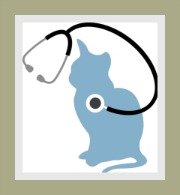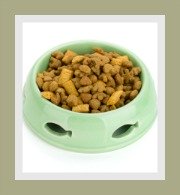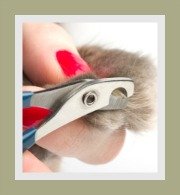Cat Diarrhea Treatment
Treating the Cause
Cat diarrhea treatment will depend on the cause of the diarrhea. There are many causes of diarrhea and they range from a simple dietary issue to more serious viral, bacterial and systemic conditions.
Treating cat diarrhea is important as diarrhea is generally a sign of an underlying illness and this must be correctly diagnosed before treatment can commence.
initial treatment for feline diarrhea
First aid treatment can be given in certain conditions, but a visit to the vet should always be the first consideration.
- Kittens with diarrhea must be taken to a vet immediately
- The first step in treating diarrhea is to hold back all food for at least 12 - 24 hours until the diagnosis can be confirmed. This will give the gastrointestinal tract time to rest.
- Water (not milk) should be provided and your cat should be encouraged to drink.
- Never give your cat 'human medicine' or over the counter medicines unless indicated by the vet.
- If the diarrhea subsides after 24 hours, food can be re-introduced.
- Only feed small quantities of a bland diet consisting of boiled rice and chicken every 4 hours.
- Isolate your cat from other kitties, keep your cat indoors and monitor it closely.
- If the diarrhea stops, gradually re-introduce the cats normal diet by mixing it with the rice and chicken.
- If your cat's diarrhea persists visit the vet immediately.
cat diarrhea treatment
Treatment will be based on the cause of the diarrhea. As there are so many causes of feline diarrhea, treatment may vary considerably.
-
Dehydration will be treated by replacing fluids using an intravenous or subcutaneous drip
- For a food allergy switch to an alternative diet.
- Avoid
over-feeding cats and kittens and adhere to the feeding instructions on
the label.
- Lactose intolerance causes diarrhea - remove cow's
milk from your cat's diet
- If your cat is suffering from stress related diarrhea withhold
food for 24 hours and offer water only.
- Keep the cat or kitten calm and
provide a peaceful and stress-free environment.
- Hookworms, roundworms and tapeworms will be treated with a
course of deworming medication specific to each parasite.
- Protozoa will
be treated with the relevant antibiotic, antiprotozoal and
antimicrobial agents
- Bacterial infections will be treaded using antibiotics
- Intestinal obstructions will need to be removed via surgery
- Tumors will be removed via surgery and in the case of
malignant tumors, radiation therapy or chemotherapy may be indicated. (In
some instances the only option is euthanasia).
- In non-bacterial cat diarrhea, the veterinarian may
prescribe drugs that decrease gastric and intestinal motility. This
allows fluids to be reabsorbed via the intestinal wall thereby reducing
the amount of water in the stool.
- Anti-inflammatory drugs to reduce pain and inflammation
- Drugs to reduce anxiety may be prescribed if the cat is stressed
- If the diarrhea is caused by underlying feline diseases (viral or systemic disease), the vet will treat the underlying disease and control the diarrhea accordingly.
natural or homeopathic medicine
We recommend that you discuss natural or herbal remedies for cat diarrhea treatment with your veterinarian. Many herbs are toxic to cats.
There are various homeopathic remedies and herbal medicines which we believe can be used for diarrhea:
- arsenicum album
- nux vomica
- podophyllum
- Slippery elm
Please confirm with a vet with an interest in natural remedies / homeopathy if the above remedies are suitable for cat diarrhea treatment.
Treating cat diarrhea with human medicines is also not advised unless instructed by a veterinarian.
Your vet will be the best person to prescribe cat diarrhea medicine.
preventing cat diarrhea
Here are a few precautionary measures that may assist in reducing the chances of your cat getting cat diarrhea:
- Kittens should remain with their mother until they are 12 - 14 weeks old. (They need those life-saving antibodies)
- Always have your new kitten examined by vet to ensure a clean bill of health
- Feed your cat a healthy, well balanced diet of the highest quality that you can afford
- If your cat is doing well on a specific diet, do not change it
- Limit treats and do not feed your cat table scraps
- Do not over-feed your cat
- Ensure that your cat receives all its cat vaccinations and booster shots
- Deworm your cat regularly
- Groom your cat frequently and keep your pet tick, flea and mite free
- Keep your cat's environment clean - this includes its litter box, bedding and food bowls
- Indoor cats are less likely to be exposed to those organisms responsible for causing cat diarrhea
- Your cat should visit the veterinarian annually for a general check-up
If your cat has diarrhea, be sure to wear gloves when clearing the litter box and wash your hands after handling the cat.
Some feline diseases are zoonotic and you do need to prevent cross contamination with cat diarrhea.
Top of Cat Diarrhea Treatment Page
Return to Cat Diarrhea > Feline Diarrhea
search our site
please like us
share our site
recommend on google
favorite pages





